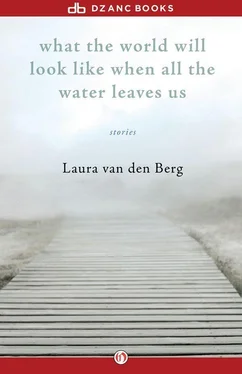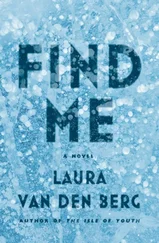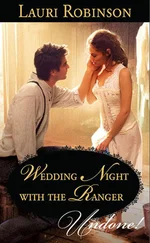“That’s when I realized it was a tunnel,” he said.
He had that steely look, standing with his legs parted, squeezing the yo-yo so hard his knuckles whitened — the same expression he had when the school counselor asked me to pick him up one afternoon in April and on the way home, Denver explained that, while watching a war movie in history class, he had become so convinced the soldiers were going to march through the screen and overtake the school, he ran into the hall and hid in the girls’ bathroom so he’d have a chance to escape. When I went to see the guidance counselor the next day, an elfish man with a gray beard and pointed ears, he talked about generalized anxiety and object-related fixations and I imagined paintings from the abstract art class I took in my freshman year, the swirls of color that spiraled together and apart.
I leaned over the hole. “Can I see?”
He handed me his goggles. “Go ahead.”
I put on the goggles and kneeled on the sidewalk, trying not to care who might be watching. When I ducked underneath the street, the darkness was cool against my lips and forehead. I caught the faint odor of gasoline, saw a quick movement. Just a shadow, perhaps. Or a rat.
“What do you think?”
“It could be a tunnel.” I stood and removed the goggles. “But I doubt it goes to the other side of the world.”
He pulled the goggles from my hand and looped them around his neck “Where do you think it goes then?”
I tilted my head to the side, pretending to consider his question. “New Jersey. I bet it goes to New Jersey. Maybe even Rhode Island.”
“Don’t tell me that,” he said. “Don’t talk to me like I don’t know what I’m doing.”
When I suggested he spend more time with neighborhood kids and take a break from the hole, he stormed into the apartment. He should be thinking about girls and sneaking his first beer, but that’s not my brother — or at least not the boy that emerged from Aunt Lucille’s phone call to the boarding school and the two-coffin funeral. She was the one who drove up to New Hampshire and collected him, while I took the train into Lowell. They were waiting outside my parents’ house when the taxi dropped me off, Aunt Lucille standing on the edge of the driveway, her posture rigid and square, Denver sitting on the front lawn, pulling up fistfuls of grass, the gray house looming behind him. Since then, he’d come to believe in magic, in making the unknowable knowable. I viewed him with equal doses of fear and admiration.
Inside I found him sulking on the pullout sofa in the living room, his makeshift sleeping quarters while we saved for a larger apartment. He had lined the shelves of our bookcase with toy dinosaurs and science books, taped a pink and yellow map of South America to the wall. The last book he read was about scientists digging to the center of the earth to study the rocks and molten core, but it seemed he’d settled for reaching the other side of the world.
Denver told me that he was going to the community pool to swim laps, which I knew was a lie. I didn’t know where he really planned to go, only that he wanted to be away from me. When the front door closed, something deep in my body ached.
After my brother had been gone for a while, I found a message from a neighbor on the answering machine, complaining that Denver had spent the day running up and down the sidewalk in his Superman cape, shouting about emergencies. I worried someone might call Children’s Services and that Denver would have to go live with Aunt Lucille. I called the neighbor back and told her I had talked things over with Denver and he had promised to not be such a nuisance.
“And the costumes,” she pressed. I’d seen this woman around, in her running pants and sweatshirts and pink hair rollers. She smoked skinny cigarettes and owned a black Pomeranian. “What are you doing about the costumes?”
“You mean the Superman cape?”
“It’s not normal for a boy his age.”
“Listen.” I leaned against the kitchen counter, the speckled Formica edge digging into the small of my back. “We’ve had a hard year, Denver and me.”
“You’re not the first person life has been unkind to.”
I wanted to tell her that she was right in saying we weren’t the first to suffer, but sometimes it felt like we were the only people out there with losses so raw and gaping, and that we could both use a little understanding. I didn’t say any of this. I thanked her for her time and offered another apology. She reminded me the recycling was supposed to go out on Wednesday, not Tuesday, and then hung up the phone.

My parents weren’t getting along the year they died. I was away at college, studying to become an art historian, and never knew all the details. But I could tell when I came home for Thanksgiving and Christmas and spring break that things were not as they always had been. From eavesdropping on late-night arguments, I was able to determine my mother had gotten the credit for discovering the highland mangabey in Tanzania and had been approached by several prominent scientists planning an expedition to Indonesia. My father had not been invited.
It was his idea to look for the mapinguary in the Amazon. My mother had argued it wasn’t the best use of their time and research grants, that the creature probably didn’t even exist. But in the end, my father convinced her. I could imagine his thoughts as he retreated to his study at the end of their spats and slammed the door: returning from the Amazon victorious, giving interviews to top magazines and talking about how my mother hadn’t even believed in the mapinguary and without his intuition and savvy, they never would have located this remarkable specimen.
I took out Lugo’s letter and sat on the edge of my bed. I re-read the part about the snake and my mother crying out for Calvin. Sometimes I wondered if he wasn’t just trying to ease our grief by giving us an interesting story, a history to carry. Surely my mother, with all her knowledge and experience, would have known better than to get so close to a deadly snake, and I recalled reading that poisonous snakes only struck once before retreating. But perhaps they had gotten too casual and confident after so many years of successful travel. Perhaps this coral snake, for the first and last time in its life, possessed the power to bite twice. It was a place where people lived in floating houses, amongst giant spiders and toxic dart frogs and carnivorous plants. A land of treachery and mystery. I would never know if Lugo’s story was what actually happened. If my parents died from the coral snake or yellow fever or something else. If my mother called for Calvin. If my father went first. If they reached for each other at the end. How long it took them to die.
At dusk, Denver came home with two skinned knees, though he wouldn’t say how he earned them. He refused my offers to make macaroni and cheese or read aloud from science books, and fell asleep earlier than usual in the living room. I sat on my bed, holding Lugo’s letter, until the apartment was dark except for the orange glow of my desk lamp. Denver’s body was so quiet that I checked the rhythm of his breath as I slipped outside, where I stood on the sidewalk and stared at the hole. The streetlights gave the perimeter a pale gleam and in the darkness, it seemed deeper, more magnetic. I kneeled and rested my hands over the hole, feeling the heat rise from it like breath. I called into it, softly, and there were no echoes.

The next day, Jordan appeared in the bookstore at his usual time, just after twelve. I was finishing lunch: a cheese sandwich and a can of iced tea. When I heard the bells, I brushed the Wonderbread crumbs from my shirt and dabbed the sides of my mouth with my thumb, then walked out of the office. I had dressed up a little, a white blouse and a loose black skirt, silver bracelets on my wrists.
Читать дальше














